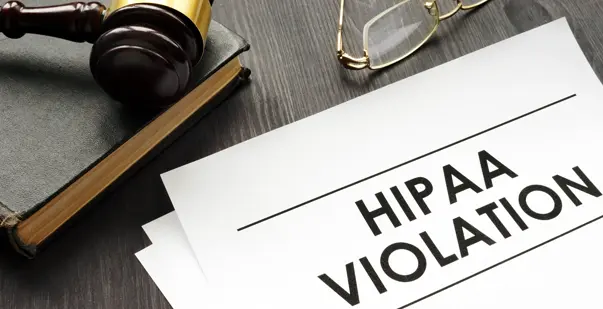What are the penalties for HIPAA violations?

July 16, 2024
The Health Insurance Portability and Accountability Act (HIPAA) was put in place to protect sensitive patient information. It sets the rules for how healthcare data should be handled, but even with those rules, violations still happen more often than you’d expect.
Sometimes it’s an employee looking at a record they shouldn’t have seen. Other times, it’s a bigger issue, like failing to follow basic privacy protocols. Whatever the cause, HIPAA violations are serious and can lead to heavy fines or even criminal charges, depending on how intentional or severe the breach was.
In the sections below, we’ll break down the types of penalties, what influences them, and what healthcare organizations can do to stay on the right side of the law.
What Are the Civil Monetary Penalties for HIPAA Violations?
HIPAA violations don’t always come with the same price tag. Sometimes they’re a result of honest mistakes, other times it’s a matter of clear neglect. Either way, the penalties can get expensive—and fast.
When the U.S. Department of Health and Human Services (HHS) finds that an organization didn’t follow HIPAA rules, they can issue civil monetary penalties (also called CMPs). These fines depend a lot on what happened and whether the organization should have known better.
In simple terms, the more severe or intentional the violation, the higher the penalty. HIPAA fines can range from $0 to $1,000 per violation. And if a single breach impacts multiple individuals, each case is treated as a separate violation, which increases the total penalty amount.
Since each violation can carry its own fine, the total amount can grow quickly. These penalties are designed to encourage healthcare organizations to take patient privacy seriously and follow HIPAA rules closely.
Criminal HIPAA Penalties: What Happens When It’s More Than a Mistake?
Not all HIPAA violations are honest errors. When someone knowingly breaks the rules—or goes as far as to misuse patient information—things can move into criminal territory. And at that point, we’re no longer just talking about fines. Jail time becomes a real possibility.
Criminal penalties usually come into play when someone deliberately accesses or shares Protected Health Information (PHI) without permission. HIPAA’s criminal enforcement rules lay out what counts as a serious offense and what kind of punishment it could bring.
The consequences vary depending on what happened. Some cases are treated as misdemeanors, like when someone accesses PHI without proper clearance, but not for personal gain. In these situations, the penalty can go up to $50,000 and include up to one year in prison.
Felony-level violations are much more serious. These involve intentionally using PHI to cause harm, commit fraud, or benefit personally. That includes things like:
- Identity theft
- Selling or misusing PHI for profit
- Using PHI to support healthcare scams
For these offenses, the penalties can reach $250,000 in fines and up to 10 years behind bars.
Bottom line: HIPAA takes criminal intent seriously—and so do the courts.
🔗 Read More: What is HIPAA Violation?
What Factors Affect the Severity of HIPAA Penalties?
Not all HIPAA violations are treated the same. The penalties depend on a few key factors, and understanding them helps explain why some cases lead to warnings, while others lead to major fines or even criminal charges.
Here’s what enforcement agencies look at:
- Nature of the violation: Was this a simple mistake or a clear act of wrongdoing? Intentional misconduct almost always leads to harsher consequences than accidental slip-ups.
- How much harm was done: If the breach led to things like financial loss or identity theft, expect the penalties to be more severe.
- Size of the organization: Larger healthcare organizations are usually held to a higher standard. But smaller providers aren’t off the hook—they can face serious penalties too, especially if their systems are weak or outdated.
- Past compliance issues: If an organization has a history of ignoring HIPAA rules, regulators are less likely to be lenient. Repeat offenders often get hit harder.
- Intent: This is a big one. Violations caused by carelessness aren’t treated the same as those that are clearly intentional. The more deliberate the action, the tougher the penalty.
All of these factors help determine the response, whether that’s a fine, a corrective action plan, or something more serious.
How Can Healthcare Entities Reduce the Risk of Violations?
Avoiding HIPAA violations isn’t just about reacting when something goes wrong—it’s about building a system that prevents problems from happening in the first place. Healthcare organizations have a responsibility to keep patient information safe, and that starts with following the right steps.
Here are a few key ways to lower the risk:
- HIPAA Compliance Training: Make training a regular part of the workflow. Whether it’s once a year or twice, staff should be reminded of the rules around Protected Health Information (PHI)—and what happens if those rules aren’t followed.
- Risk Assessments: Take a hard look at where the vulnerabilities are. That could mean checking your software for weaknesses, reviewing how staff access records, or planning for worst-case scenarios like theft or natural disasters.
- Secure Data Storage: Keep patient records safe with strong encryption, password protections, and secure backups. Whether data is stored locally or in the cloud, it should always be locked down and monitored.
Taking these steps not only helps meet HIPAA requirements, it also builds trust with patients who are counting on providers to keep their health information private.
Conclusion
Understanding the consequences of HIPAA noncompliance isn’t just about avoiding fines—it’s about protecting patient privacy and maintaining trust. For any healthcare organization, staying compliant isn’t optional. It’s part of the responsibility that comes with handling sensitive health information.
Penalties exist for a reason. They serve as a strong reminder that carelessness or intentional misuse of Protected Health Information (PHI) won’t be taken lightly. That’s why it’s so important for healthcare providers to take proactive steps: train their teams, run regular risk assessments, secure their data, and have a solid plan in place in case something goes wrong.
At the end of the day, HIPAA compliance is about doing right by your patients, and that starts with being prepared.





